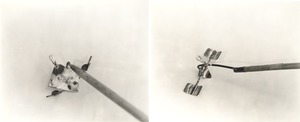Perkins School for the Blind
Manual Arts and Vocational Training

Detail from:
Business Education
This collection of photographs relate to Manual Training, Manual Arts, Independent Living Skills, Vocational Training and workshops for adults who are blind. Piano tuning, sewing, chair caning, and animal husbandry are among the subjects. Throughout the history of Perkins School for the Blind, Manual Arts has played an important role. The following quote is from the 1931 Annual Report: "Emphasis is placed on manual training of various kinds. The hands are trained as far as possible to take the place of the eyes."
Piano tuning was a prominent department at Perkins School for the Blind for much of its history. Perkins-trained tuners worked on pianos at Boston Public Schools for over fifty years. Historically schools for the blind had a major focus on music instruction.
In 1913, Perkins moved from South Boston to a large estate in Watertown, Massachusetts on the banks of the Charles River. The estate included an orchard and farmland. The move allowed for an expanded curriculum to include planting crops and raising animals. In 1934, profits from the poultry business maintained by Perkins Lower School boys defrayed the costs of an airplane ride organized as part of a transportation study.
Additional Information:
Visit perkins.org/archives for more information about the Perkins Archives.
Rights and Permissions: Use of the images from the collection of Perkins School for the Blind requires written permission. For more information, please visit perkins.org/image-licensing or contact the Archivist at archives@perkins.org
Piano tuning was a prominent department at Perkins School for the Blind for much of its history. Perkins-trained tuners worked on pianos at Boston Public Schools for over fifty years. Historically schools for the blind had a major focus on music instruction.
In 1913, Perkins moved from South Boston to a large estate in Watertown, Massachusetts on the banks of the Charles River. The estate included an orchard and farmland. The move allowed for an expanded curriculum to include planting crops and raising animals. In 1934, profits from the poultry business maintained by Perkins Lower School boys defrayed the costs of an airplane ride organized as part of a transportation study.
Additional Information:
Visit perkins.org/archives for more information about the Perkins Archives.
Rights and Permissions: Use of the images from the collection of Perkins School for the Blind requires written permission. For more information, please visit perkins.org/image-licensing or contact the Archivist at archives@perkins.org






